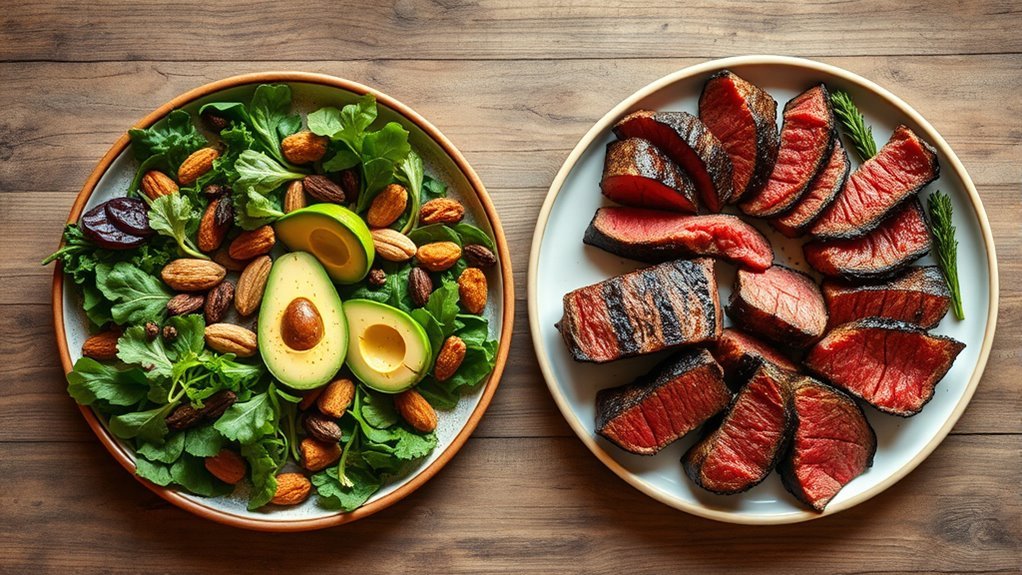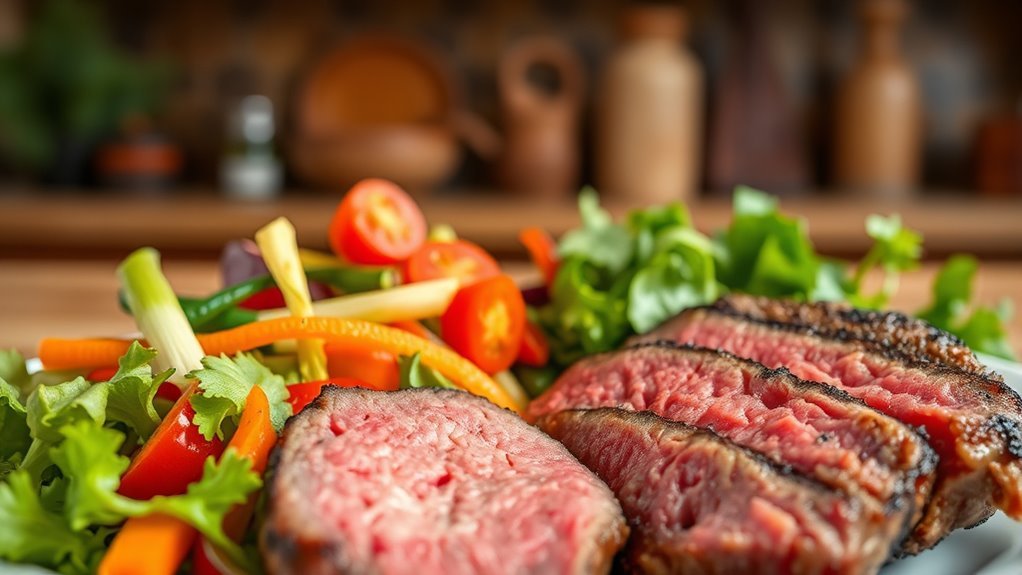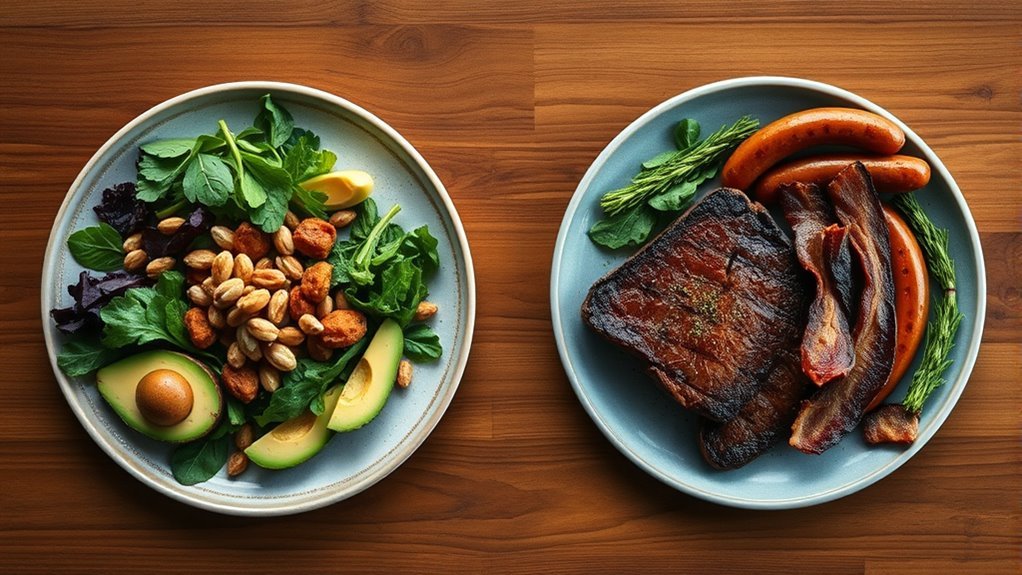The ketogenic diet and carnivore diet aren’t the same, though both emphasize low carbohydrate intake. Keto permits various low-carb foods, like vegetables and nuts, while carnivore strictly focuses on animal products. This creates differences in flexibility and nutrient diversity. Both diets can help with weight loss and energy levels, but they also have unique benefits and drawbacks. If you’re curious about how these diets may fit into your lifestyle, there’s more to explore on this topic.
Understanding the Ketogenic Diet

When you explore the ketogenic diet, you’ll find that it primarily focuses on drastically reducing carbohydrate intake while increasing fat consumption. The keto basics emphasize a macronutrient ratio typically around 70% fat, 25% protein, and 5% carbohydrates. This shift encourages your body to enter a state called ketosis, where it becomes efficient at burning fat for fuel instead of carbs. As you adapt, known as fat adaptation, your body learns to utilize fat as its primary energy source. Many people report increased mental clarity and sustained energy during this change. However, it’s crucial to monitor your nutrient intake closely and choose high-quality fats to guarantee you’re supporting your overall health while enjoying the freedom that comes with this dietary approach. Additionally, understanding the importance of nutritional composition is vital for maintaining ketosis effectively.
Exploring the Carnivore Diet

While many diets emphasize a variety of foods, the carnivore diet takes a radically different approach by focusing exclusively on animal products. By adhering to carnivore principles, you’ll primarily consume meat, fish, and animal-derived foods, which can lead to increased nutrient density. This diet often results in significant weight loss and improved digestive health for some, as it eliminates common dietary restrictions like grains and sugars. However, it also raises ethical considerations regarding animal welfare and environmental impact. If you’re considering this lifestyle adaptation, be aware that the lack of food variety may challenge your culinary creativity. Ultimately, it’s important to weigh the benefits against the potential drawbacks when exploring the carnivore diet.
Key Similarities Between Keto and Carnivore

Although the keto and carnivore diets differ in their food variety, they share key similarities that can appeal to those seeking dietary changes. Both diets emphasize low carbohydrate intake, encouraging your body to enter a state of ketosis, where it burns fat for fuel. This approach can help with weight loss and enhance energy levels. Additionally, both diets challenge common keto misconceptions and carnivore myths, such as the belief that eating fat leads to weight gain. Instead, they promote a higher intake of healthy fats, which can support metabolic health. If you’re looking for simplicity in your meals, both diets offer a streamlined approach, allowing you to focus on nutrient-dense foods while enjoying a sense of freedom in your dietary choices. Moreover, both diets can lead to improved blood sugar control, contributing to better overall health and mental clarity.
Major Differences in Food Choices
When it comes to food choices, the keto and carnivore diets greatly differ in allowed categories. While keto permits a variety of low-carb foods, including certain vegetables and nuts, the carnivore diet strictly focuses on animal products. Understanding these distinctions, along with their macronutrient ratios and plant-based options, can help you choose the diet that best aligns with your health goals. Additionally, the keto diet emphasizes nutrient-dense food options that nourish the body, which is not a consideration in the carnivore approach.
Allowed Food Categories
One of the major differences between the keto and carnivore diets lies in their allowed food categories. On the keto diet, you can enjoy a variety of low-carb vegetables, nuts, seeds, and certain dairy products, alongside healthy fats and protein sources. This flexibility means you have more options when it comes to meal preparation, which can help you adhere to the diet in the long run. Additionally, incorporating low-carb vegetables into your meals not only boosts nutrient intake but also keeps your carb count in check. In contrast, the carnivore diet imposes stricter food restrictions, allowing only animal-based products like meat, fish, and eggs. This limited selection can be appealing for those seeking simplicity but may feel restrictive for others. Ultimately, understanding these allowed food categories helps you make informed choices that align with your personal dietary goals and preferences.
Macronutrient Ratios
While both the keto and carnivore diets focus on high fat and low carbohydrate intake, their macronutrient ratios differ considerably, affecting your overall food choices and nutritional balance. The keto diet typically emphasizes a macronutrient distribution of about 70% fat, 25% protein, and 5% carbs, allowing for a variety of high-fat foods. In contrast, the carnivore diet consists almost entirely of animal products, leading to a macronutrient distribution of approximately 80-90% fat and 10-20% protein. This stark difference in dietary balance can impact your energy levels and nutritional adequacy. Additionally, the keto diet promotes metabolic adaptation which enhances the body’s efficiency in utilizing fat for energy.
| Diet Type | Macronutrient Distribution |
|---|---|
| Keto | 70% Fat, 25% Protein, 5% Carbs |
| Carnivore | 80-90% Fat, 10-20% Protein |
Plant-Based Options
Although both the keto and carnivore diets primarily focus on animal-based foods, the inclusion of plant-based options is a significant differentiator. The keto diet often accommodates plant-based substitutes, allowing you to incorporate low-carb vegetables, nuts, and seeds, which contribute to nutrient diversity. If you lean towards vegetarian options, you can find ways to maintain ketosis through careful selection of high-fat, low-carb plants. Conversely, the carnivore diet strictly eliminates all plant foods, focusing solely on animal products. This exclusion limits your nutrient diversity and eliminates vegan alternatives. Ultimately, if you value freedom in your dietary choices, the keto diet offers more flexibility, enabling you to enjoy a broader range of foods while still achieving your health goals. Additionally, incorporating low-carb leafy greens like spinach and kale can enhance nutrient intake on a ketogenic diet.
Nutritional Composition of Each Diet
Understanding the nutritional composition of the keto and carnivore diets reveals key differences in their food sources and macronutrient profiles. While both diets have dietary restrictions, they vary considerably in nutrient density and caloric intake. Keto emphasizes high fats, moderate proteins, and low carbs, while carnivore focuses exclusively on animal products, impacting fiber content and vitamin sources.
| Nutrient | Keto Diet | Carnivore Diet |
|---|---|---|
| Protein Quality | Moderate to High | High |
| Fiber Content | Low | None |
| Vitamin Sources | Variety from plants | Limited to animal sources |
| Mineral Availability | Moderate | High in certain minerals |
| Metabolic Effects | Ketosis | Possible ketosis |
Each diet offers unique metabolic effects, influencing your overall health and nutrition. Additionally, long-term effects of both diets should be considered to ensure they align with your overall health goals.
Potential Health Benefits
Both the keto and carnivore diets have garnered attention for their potential health benefits, stemming from their distinct nutritional compositions. You might find that both diets promote metabolic benefits, which can lead to improved energy levels and fat loss. The keto diet encourages your body to enter a state of ketosis, where it burns fat for fuel, potentially enhancing your mental clarity and focus. On the other hand, the carnivore diet, rich in animal-based proteins and fats, may lead to significant health improvements, including better digestion and reduced inflammation for some individuals. Both approaches prioritize whole, unprocessed foods, which can support overall well-being and empower you to take control of your health journey. Additionally, understanding the importance of adjusting macro ratios based on individual needs can further enhance the effectiveness of these diets.
Possible Drawbacks and Risks
While the keto and carnivore diets offer various potential benefits, it’s important to contemplate their possible drawbacks and risks. You might experience nutritional deficiencies, as both diets can limit essential food groups. This restriction can lead to digestive issues, like constipation or diarrhea, due to low fiber intake. Inflammation concerns may arise, particularly if you have underlying health conditions. The mental effects of strict dietary adherence can also be challenging, possibly leading to mood swings or cravings. Furthermore, sustainability challenges come into play, as both diets often rely on animal products, raising environmental questions. Finally, consider the social implications; dining out or attending gatherings can become complicated when adhering to such restrictive eating patterns. Additionally, nutritional balance is crucial to avoid deficiencies and maintain overall health while following these diets.
Who Should Consider Each Diet?
Choosing a diet that fits your lifestyle and health goals is essential, especially after considering the potential drawbacks of restrictive eating patterns like keto and carnivore. Understanding dietary suitability is vital, as both diets cater to different individual preferences and health conditions.
| Diet Type | Who It Suits | Lifestyle Factors |
|---|---|---|
| Keto | Those seeking weight loss, improved energy, or better blood sugar control | Active individuals, busy lifestyles |
| Carnivore | People with specific food intolerances or those looking for simplicity | Minimalist eaters, meat lovers |
When choosing between keto and carnivore, reflect on your health conditions and lifestyle factors. Both diets can offer benefits, but their suitability varies from person to person. Make an informed choice that aligns with your needs. Additionally, it’s important to consider potential nutritional deficiencies that may arise from each diet, as they can impact overall health.
Making the Right Choice for Your Lifestyle
When choosing between the keto and carnivore diets, it’s important to evaluate their nutritional differences and how they align with your health goals. Both diets offer unique benefits, but long-term sustainability is a vital factor that can impact your lifestyle. Understanding these elements will help you make an informed decision that suits your needs.
Nutritional Differences Explained
Understanding the nutritional differences between the keto and carnivore diets is essential for making an informed choice that aligns with your lifestyle. The keto diet emphasizes high-fat, low-carb intake, promoting nutrient density from various food sources, including vegetables, nuts, and dairy. This variety allows for a broader range of dietary preferences, catering to those who want to include fiber-rich foods. In contrast, the carnivore diet strictly limits you to animal products, which can lead to higher protein and fat intake while lacking essential vitamins and minerals typically found in plant-based foods. Ultimately, your choice depends on how these nutritional differences fit into your personal goals and lifestyle. Consider what aligns best with your needs for energy and overall well-being.
Health Benefits Comparison
While both the keto and carnivore diets offer unique health benefits, it’s important to reflect on how each aligns with your personal health goals. The keto diet’s emphasis on low-carb, high-fat intake can lead to improved insulin sensitivity and weight loss, often resulting in favorable health outcomes. On the other hand, the carnivore diet, which relies solely on animal products, may enhance nutrient density and simplify food choices, potentially boosting diet effectiveness for some individuals. However, it’s essential to evaluate how these diets fit your lifestyle and nutritional needs. Ultimately, the best choice will depend on your personal preferences, health conditions, and long-term goals. Embracing the right diet can empower you to achieve sustainable health outcomes.
Long-term Sustainability Factors
Choosing a diet that you can stick with long-term is essential for maintaining your health and well-being. When considering the keto and carnivore diets, think about long-term sustainability and dietary adherence. The keto diet offers more flexibility with food choices, which might make it easier for you to maintain over time. On the other hand, the carnivore diet is more restrictive and could lead to challenges in social situations or dining out. Ultimately, your lifestyle, preferences, and health goals will dictate what’s sustainable for you. It’s vital to assess how these diets fit into your daily life and whether you can envision following them for years to come, ensuring you remain healthy and satisfied without feeling deprived.
Frequently Asked Questions
Can I Combine Keto and Carnivore Diets Together?
You can definitely combine keto and carnivore diets together! In fact, studies show that nearly 20% of people on low-carb diets experience significant weight loss. By blending keto compatibility with carnivore benefits, you can enjoy a high-fat, low-carb approach that may enhance your energy levels and promote fat burning. Just make sure to listen to your body and adjust accordingly, as individual responses can vary widely. Freedom in dieting can lead to great results!
Are There Specific Supplements Recommended for These Diets?
Yes, there are specific supplements to evaluate for these diets. You might want to focus on magnesium, potassium, and sodium to maintain electrolyte balance. Additionally, since both diets can lead to vitamin deficiencies—especially in vitamins C and K—you could benefit from a multivitamin. It’s important to listen to your body and adjust your supplementation based on how you feel, ensuring you maintain ideal health while enjoying your dietary freedom.
How Do These Diets Affect Athletic Performance?
Think of your body as a finely-tuned engine. On a keto diet, you might experience improved energy levels and quicker fat-burning for enhanced performance, especially during short bursts of activity. Conversely, the carnivore diet may boost endurance by providing high-quality protein and fat, fueling longer workouts. However, individual responses vary; some athletes thrive on keto performance, while others find carnivore endurance suits them better. It’s about finding what fuels your engine best!
What Are the Long-Term Effects of Each Diet?
The long-term effects of both diets can vary greatly. While the Keto diet may offer long-term sustainability for some, it can also lead to health risks like nutrient deficiencies if not balanced properly. On the other hand, the Carnivore diet might provide short-term benefits but raises concerns about its sustainability and potential health risks, such as heart disease. It’s crucial to evaluate individual health needs and consult with a professional before committing to either diet.
Can Children Safely Follow Keto or Carnivore Diets?
You might think a keto or carnivore diet could turn your child into a superhero, but it’s not that simple! While some kids may thrive on these diets, child nutrition experts caution against them due to safety concerns. Nutritional balance is essential for growing bodies. If you’re considering these diets, consult a pediatrician or dietitian to guarantee your child’s diet meets their unique needs and supports their overall health.
References
- https://en.wikipedia.org/wiki/Ketogenic_diet
- https://www.healthline.com/nutrition/keto-vs-carnivore-diet
- https://www.ncbi.nlm.nih.gov/pmc/articles/PMC6819783/
- https://www.ncbi.nlm.nih.gov/pmc/articles/PMC8833663/
- https://www.webmd.com/diet/carnivore-diet-overview
- https://www.verywellfit.com/carnivore-diet-overview-5195438
- https://www.mayoclinic.org/healthy-lifestyle/nutrition-and-healthy-eating/expert-answers/carnivore-diet/faq-20458683
- https://www.health.harvard.edu/blog/the-carnivore-diet-2021030821950


